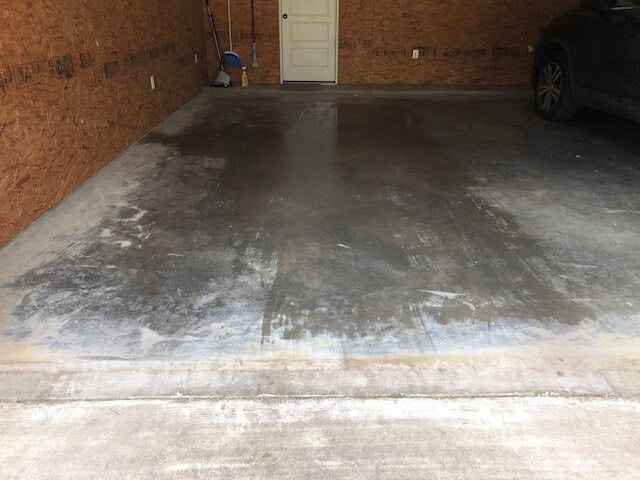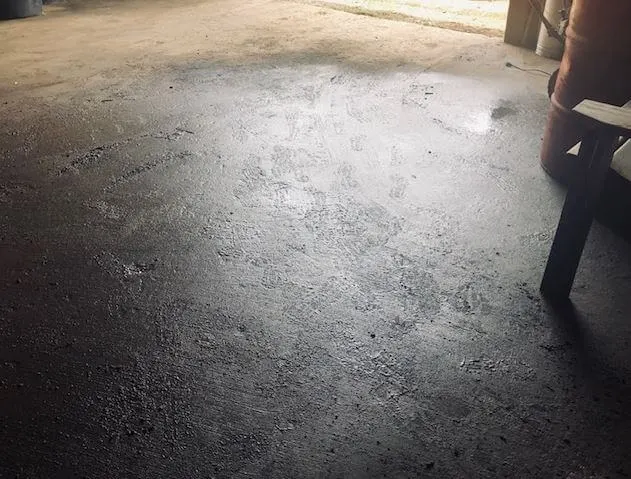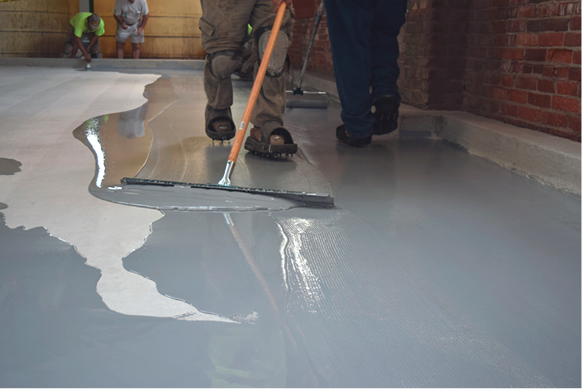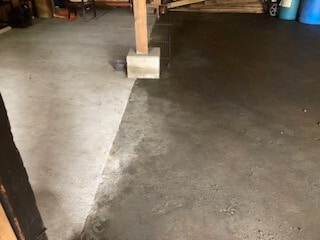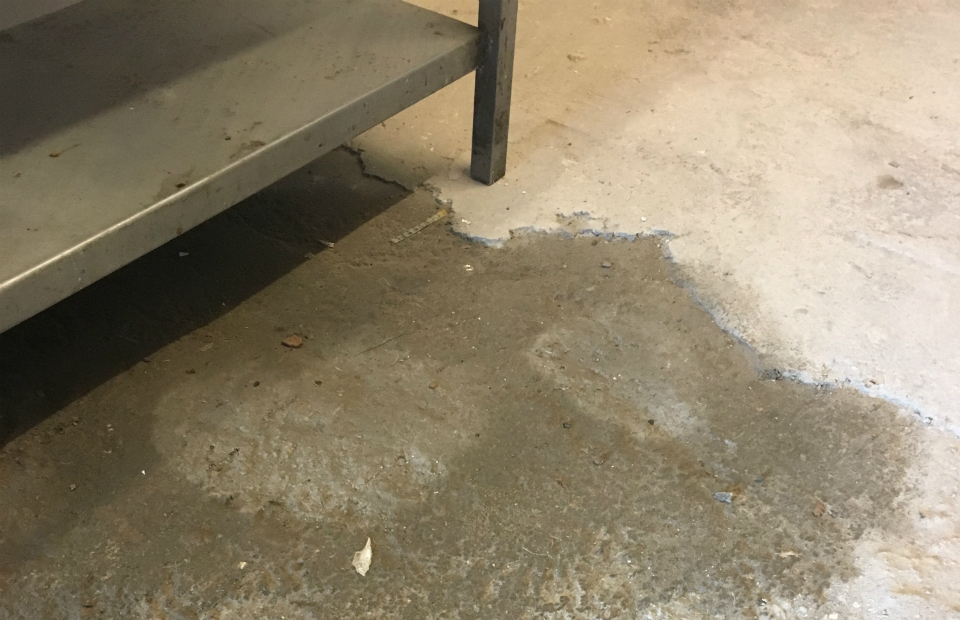Understanding the Causes of Garage Floor Moisture
Garage floor moisture is a common problem that many homeowners face. It can lead to several issues such as mold and mildew growth, rusting of tools and equipment, and damage to the garage floor itself. To effectively address this issue, it is important to understand the underlying causes of garage floor moisture.
- Poor Drainage: One of the primary causes of garage floor moisture is poor drainage. If the garage floor is not properly sloped or does not have a functioning drain system, water can accumulate and result in moisture problems. This can be exacerbated during periods of heavy rainfall or snow melt.
- Condensation: Condensation is another significant cause of garage floor moisture. It occurs when warm air comes into contact with a cold surface, such as the garage floor. This temperature difference causes the moisture in the air to condense and accumulate on the floor. Factors that contribute to condensation include poor insulation, inadequate ventilation, and temperature fluctuations.
- Water Leakage: Water leakage from external sources can also contribute to garage floor moisture. This can occur due to cracks or gaps in the walls or foundation of the garage, faulty plumbing, or improper sealing around windows and doors. Water seepage can lead to persistent moisture problems in the garage floor.
- High Humidity: High humidity levels in the garage can result in moisture issues. Humidity can be caused by several factors, such as poor ventilation, inadequate insulation, or the presence of water sources within the garage. High humidity levels can create a damp environment that promotes mold and mildew growth and increases the likelihood of garage floor moisture.
- Natural Moisture Sources: In some cases, garage floor moisture may be caused by natural sources. For instance, if the garage is built on soil with a high water table, groundwater can seep into the garage and result in moisture problems. Additionally, if the garage is situated in a location prone to flooding or heavy moisture, it can contribute to garage floor moisture.
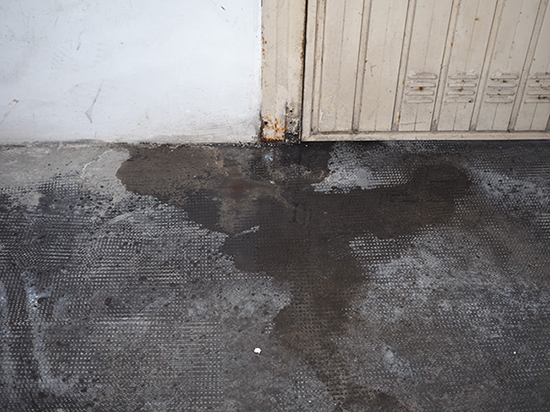
The Impact of Garage Floor Moisture on Your Home
Garage floor moisture can have a significant impact on your home’s overall condition and structural integrity. Understanding the potential consequences of moisture in your garage can help you take necessary precautions to prevent any damage or issues.
One of the primary concerns associated with garage floor moisture is the formation of mold and mildew. Moisture can create a suitable environment for mold and mildew growth, which can spread throughout your garage and even into your living spaces. Mold and mildew not only cause unpleasant odors but can also trigger allergies and respiratory problems in individuals living in the house.
Additionally, excess moisture can lead to the deterioration of your garage floor and foundation. Moisture can seep into the concrete or other flooring materials, causing them to crack, become weak, or even break apart. This can compromise the structural integrity of your garage and potentially affect the stability of your entire home.
Garage floor moisture can also contribute to the corrosion and rusting of any metal objects or equipment stored in your garage. Vehicles, tools, and other belongings can suffer significant damage if exposed to constant moisture. This can result in costly repairs or replacements.
Furthermore, moisture in your garage can create a conducive environment for pests, such as termites and rodents, to thrive. These pests can cause damage to your garage and potentially infiltrate your home, leading to additional issues and expenses.
To mitigate the impact of garage floor moisture on your home, it is crucial to address the root cause of the problem. Proper insulation, adequate ventilation, and regular maintenance can help prevent moisture accumulation in your garage. Installing a dehumidifier or using moisture-absorbing materials can also help reduce humidity levels.
Regular inspections of your garage floor and addressing any signs of moisture or damage promptly are vital to prevent further issues. By taking proactive measures, you can protect your home from the detrimental effects of garage floor moisture and ensure its long-term durability.
Tips for Preventing and Controlling Garage Floor Moisture
- Proper Drainage: Ensure that your garage has a properly functioning drainage system. This includes installing gutters and downspouts to direct water away from the garage, as well as ensuring that the garage floor has a proper slope to allow water to flow toward the drainage points.
- Seal Cracks and Joints: Inspect your garage floor for any cracks or gaps and seal them with an appropriate sealant. This will prevent moisture from seeping through the floor and causing damage.
- Use Moisture Barriers: Consider using moisture barriers, such as epoxy coatings or rubber mats, on your garage floor. These barriers provide an added layer of protection against moisture and can help prevent damage to the floor.
- Proper Ventilation: Ensure that your garage has proper ventilation to allow for air circulation. This will help prevent condensation and reduce moisture levels in the garage.
- Keep the Garage Dry: Regularly clean and dry your garage floor to prevent moisture buildup. Use a squeegee or mop to remove any standing water and ensure that the floor is thoroughly dry.
- Monitor Humidity Levels: Install a humidity monitor in your garage to keep track of humidity levels. If the humidity is consistently high, consider using a dehumidifier to remove excess moisture from the air.
- Avoid Storing Wet Items: Avoid storing wet or damp items directly on the garage floor. Instead, use shelves or storage bins to keep items off the floor and allow for air circulation.
- Insulate the Garage: Proper insulation can help regulate temperature and prevent condensation in the garage. Insulate the walls and ceiling, and consider insulating the garage door as well.
- Regular Maintenance: Regularly inspect your garage floor for any signs of moisture or damage. Catching issues early on can help prevent further damage and costly repairs.
- Consult a Professional: If you are experiencing persistent moisture issues in your garage floor, it may be beneficial to consult a professional. They can assess the situation and provide expert advice on the best course of action to prevent and control garage floor moisture.
Effective Solutions for Drying Out a Moist Garage Floor
There are several effective solutions available to dry out a moist garage floor. These solutions can help prevent further damage to the floor and minimize the risk of mold growth. Here are some options to consider:
Identify the source of moisture: Before proceeding with any solution, it is important to determine the cause of the moisture. Common sources include water leaks, poor ventilation, or high humidity. Fixing the underlying issue will be essential to effectively dry out the garage floor.
Improve ventilation: Proper ventilation is crucial for preventing moisture buildup. Install exhaust fans or vents to enhance air circulation in the garage. This will help remove excess moisture and prevent condensation from forming on the floor.
Use a dehumidifier: A dehumidifier can be a valuable tool to remove excess moisture from the garage. Place the dehumidifier in a central location and let it run for several hours each day. Empty the water reservoir regularly to ensure continuous operation.
Install a vapor barrier: If the moisture is coming from the ground, consider installing a vapor barrier. This barrier, typically made of plastic or rubber, prevents moisture from seeping through the concrete and into the garage floor. It acts as a protective layer to keep the floor dry.
Utilize a floor drying agent: There are various floor drying agents available on the market that can help absorb excess moisture and speed up the drying process. These agents are usually in the form of powders or granules that can be spread over the floor. Follow the manufacturer’s instructions for the best results.
Repair any cracks or gaps: Moisture can seep through cracks or gaps in the garage floor, exacerbating the moisture problem. Inspect the floor for any signs of damage and repair them promptly. Fill in cracks with epoxy or concrete repair products to create a seamless surface.
Use a sump pump: If there is standing water in the garage, a sump pump can be an effective solution. This device removes water from the floor and pumps it outside. Install the sump pump in a low-lying area of the garage and ensure it is connected to a drainage system.
Remediating Moisture in Concrete is Not Complicated – Concrete Decor
Should You Put A Dehumidifier In Your Garage? (Condensation
How to Damp Proof Concrete Floors Permagard
Products-Amazing products for your garage floor coating installation
Related Posts:

